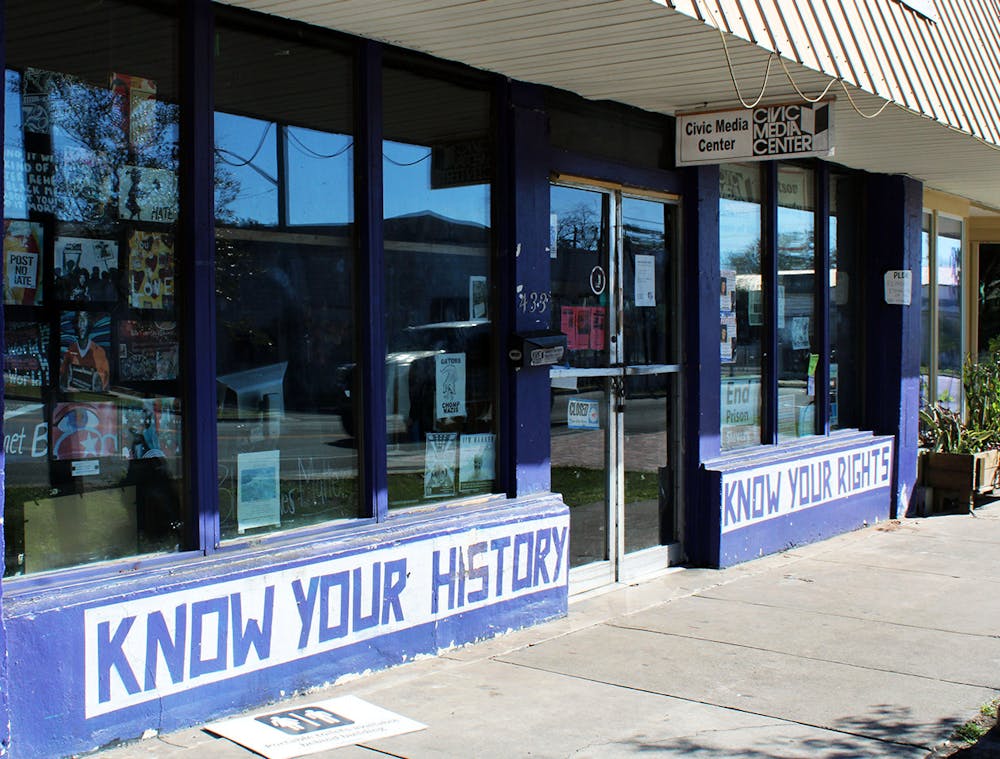Joyce Powell didn’t always love to read. But since she’s been behind bars, the 58-year-old Lowell Correctional Institution prisoner has become an avid science fiction fan.
Although she has limited access to books in prison, a Gainesville nonprofit is helping fulfill Powell’s desire to read. Recently, she received the “Foundation” book series about the rise and fall of an intergalactic empire in the future by Isaac Asimov.
“A desire accomplished is good for the soul,” she wrote in a thank you letter to Gainesville Books to Prisoners. “You all have sent a healing to my soul.”
Gainesville Books to Prisoners is a volunteer effort housed at the Civic Media Center (CMC), a nonprofit library located at 433 S. Main St.
Brooks Forrest, a CMC volunteer, said the program was founded more than 10 years ago and hadn’t fulfilled requests for several years until new volunteers revitalized it. Through both physical and monetary donations, the organization has been able to donate all kinds of books — fiction and nonfiction — to inmates in the Florida prison system.
A donation of $20 sends books to six prisoners, according to the organization’s Instagram page. The nonprofit has fulfilled more than 60 requests during its first few months back in operation.
Studies have shown access to books is integral to rehabilitation of prisoners. Increasing access to literature makes inmates less likely to become repeat offenders, according to a report from the RAND Corporation. Throughout the U.S., prisons often restrict access to some books all together — like when Illinois banned almost 200 titles. In some states, staff are tasked with approving what titles can enter prison libraries, according to a report from Teen Vogue.
Forrest said letters from Florida prisoners asking for a wide range of titles never stopped arriving at the CMC — even after the original effort stopped operating. New volunteers said they don’t have a clear idea as to when the old program stopped fulfilling requests. But now, they’re working through the backlog of requests starting with the newest letters and then backward to through ones dating back to 2018.
Prisoners most frequently request nonfiction books. Nonfiction often has a practical purpose for those inside the prison system, such as a thesaurus for aspiring authors or law textbooks for prisoners crafting a legal defense, Forrest said.
On average, they said the books donated by the CMC are passed around by seven or more prisoners.
Prisoners often write to volunteers thanking the CMC for fulfilling their requests for books.
One of Forrest’s favorite recent thank you letters was a creative collage project from a prisoner that read: “Yes, it's true. One book changed my life.’”
Since the group launched social media pages, it has received positive feedback, Ashten Mays, a 31-year old CMC volunteer, said.
“We had an influx of followers and donations,” she said. “Whether it be books or financial donations through PayPal, people want to be able to plug in and help out.”
The organization accepts donations through Paypal to help them purchase books to fulfill prisoner requests, Mays said. People can also donate new or gently used books by dropping them off in a bright yellow collection bucket at the CMC with no contact.
Eliana Morales, a 24-year old Gainesville resident, helped collect more than 30 books for the CMC’s program. She posted on the Buy Nothing Facebook group, where Alachua County residents often give away, lend and share items they no longer need.
As a former early childhood education student at Santa Fe College, Morales said access to literature and education is a right often taken for granted by those outside the prison system.
“People in prison are not thought of as human beings,” she said. “But they have interests and families of their own, traumas and hobbies. They're just like everybody else in the free world.
Powell, who has been in prison since 2001 for attempted second degree murder, said she is currently on the second book in the “Foundation” series. When she finishes all three, she plans to pass the books along to prisoners in solitary confinement to enjoy as well.
“This is truly a fantastic work of sci-fi with captivating dialogue, strategies and characters,” she wrote in a letter to The Alligator. “I’m thrilled! Intensity that I have not felt in a long, long time.”
Contact Alan Halaly at ahalaly@alligator.org. Follow him on Twitter @AlanHalaly.

Alan Halaly is a third-year journalism major and the Spring 2023 Editor-in-Chief of The Alligator. He's previously served as Engagement Managing Editor, Metro Editor and Photo Editor. Alan has also held internships with the Miami New Times and The Daily Beast, and spent his first two semesters in college on The Alligator’s Metro desk covering city and county affairs.






